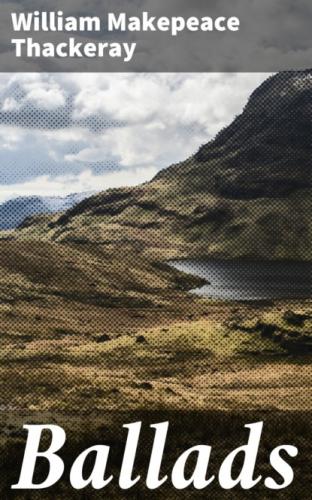A curse on all Russians—I hate them—
On all Prussian and Austrian fry;
And oh! but I pray we may meet them,
And fight them again ere I die."
'Twas thus old Peter did conclude
His chronicle with curses fit.
He spoke the tale in accents rude,
In ruder verse I copied it.
Perhaps the tale a moral bears,
(All tales in time to this must come,)
The story of two hundred years
Writ on the parchment of a drum.
What Peter told with drum and stick,
Is endless theme for poet's pen:
Is found in endless quartos thick,
Enormous books by learned men.
And ever since historian writ,
And ever since a bard could sing,
Doth each exalt with all his wit
The noble art of murdering.
We love to read the glorious page,
How bold Achilles kill'd his foe:
And Turnus, fell'd by Trojans' rage,
Went howling to the shades below.
How Godfrey led his red-cross knights,
How mad Orlando slash'd and slew;
There's not a single bard that writes
But doth the glorious theme renew.
And while, in fashion picturesque,
The poet rhymes of blood and blows,
The grave historian at his desk
Describes the same in classic prose.
Go read the works of Reverend Cox,
You'll duly see recorded there
The history of the self-same knocks
Here roughly sung by Drummer Pierre.
Of battles fierce and warriors big,
He writes in phrases dull and slow,
And waves his cauliflower wig,
And shouts "Saint George for Marlborow!"
Take Doctor Southey from the shelf,
An LL. D.—a peaceful man;
Good Lord, how doth he plume himself
Because we beat the Corsican!
From first to last his page is filled
With stirring tales how blows were struck.
He shows how we the Frenchmen kill'd,
And praises God for our good luck.
Some hints, 'tis true, of politics
The doctors give and statesman's art:
Pierre only bangs his drum and sticks,
And understands the bloody part.
He cares not what the cause may be,
He is not nice for wrong and right;
But show him where's the enemy,
He only asks to drum and fight.
They bid him fight—perhaps he wins.
And when he tells the story o'er,
The honest savage brags and grins,
And only longs to fight once more.
But luck may change, and valor fail,
Our drummer, Peter, meet reverse,
And with a moral points his tale—
The end of all such tales—a curse.
Last year, my love, it was my hap
Behind a grenadier to be,
And, but he wore a hairy cap,
No taller man, methinks, than me.
Prince Albert and the Queen, God wot,
(Be blessings on the glorious pair!)
Before us passed, I saw them not,
I only saw a cap of hair.
Your orthodox historian puts
In foremost rank the soldier thus,
The red-coat bully in his boots,
That hides the march of men from us.
He puts him there in foremost rank,
You wonder at his cap of hair:
You hear his sabre's cursed clank,
His spurs are jingling everywhere.
Go to! I hate him and his trade:
Who bade us so to cringe and bend,
And all God's peaceful people made
To such as him subservient?
Tell me what find we to admire
In epaulets and scarlet coats.
In men, because they load and fire,
And know the art of cutting throats?
. … .
Ah, gentle, tender lady mine!
The winter wind blows cold and shrill,
Come, fill me one more glass of wine,
And give the silly fools their will.
And what care we for war and wrack,
How kings and heroes rise and fall;
Look yonder,* in his coffin black,
There lies the greatest of them all!
To pluck him down, and keep him up,
Died many million human souls;
'Tis twelve o'clock, and time to sup,
Bid Mary heap the fire with coals.
He captured many thousand guns;
He wrote "The Great" before his name;
And dying, only left his sons
The recollection of his shame.
Though more than half the world was his,
He died without a rood his own;
And borrowed from his enemies
Six foot of ground to lie upon.
He fought a thousand glorious wars,
And more than half the world was his,
And somewhere now, in yonder stars,
Can tell, mayhap, what greatness is.
1841.
* This ballad was written at Paris at the time of the Second
Funeral of Napoleon.
ABD-EL-KADER AT TOULON.
OR, THE CAGED HAWK.
No more, thou lithe and long-winged hawk, of desert-life for thee;
No more across the sultry sands shalt thou go swooping free:
Blunt idle talons, idle beak, with spurning of thy chain,
Shatter against thy cage the wing thou ne'er may'st spread again.
